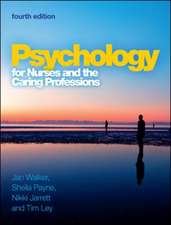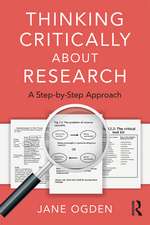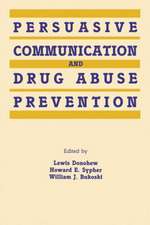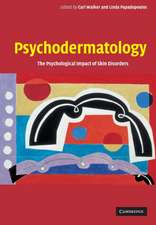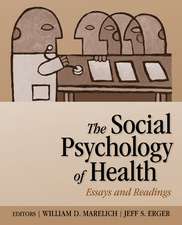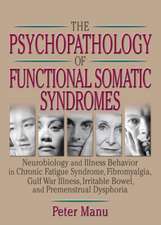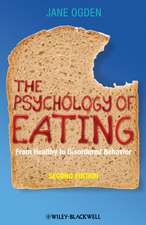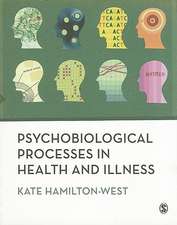Essential Readings in Health Psychology
Autor Jane Ogdenen Limba Engleză Paperback – 16 dec 2007
Preț: 254.72 lei
Preț vechi: 268.13 lei
-5% Nou
Puncte Express: 382
Preț estimativ în valută:
48.75€ • 50.70$ • 40.24£
48.75€ • 50.70$ • 40.24£
Carte tipărită la comandă
Livrare economică 14-28 aprilie
Preluare comenzi: 021 569.72.76
Specificații
ISBN-13: 9780335211388
ISBN-10: 0335211380
Pagini: 536
Ilustrații: black & white illustrations, black & white tables, figures
Dimensiuni: 194 x 261 x 28 mm
Greutate: 1.23 kg
Editura: McGraw Hill Education
Colecția Open University Press
Locul publicării:United Kingdom
ISBN-10: 0335211380
Pagini: 536
Ilustrații: black & white illustrations, black & white tables, figures
Dimensiuni: 194 x 261 x 28 mm
Greutate: 1.23 kg
Editura: McGraw Hill Education
Colecția Open University Press
Locul publicării:United Kingdom
Cuprins
Introduction and overview
Choosing the papers
The structure of this book
How to use this book
Section 1: The context of health psychology
Mokdad, A.H., Marks, J.S., Stroup, D.F., & Gerberding, J.L. (2004). Actual causes of death in the United States, 2000. JAMA, 10; 29:1238-45.
Kaplan, R.M. (1990). Behaviour as the central outcome in health care, American Psychologist, 45: 1211–20.
Section 2: Health behaviours
Theoretical debates
Explaining behaviour
Changing behaviour
Sutton, S (1998). Predicting and explaining intentions and behaviour: how well are we doing? Journal of Applied Social Psychology, 28, 1317-38.
Ogden, J. (2003). Some problems with social cognition models: a pragmatic and conceptual analysis, Health Psychology, 22(4): 424–8.
West, R. (2005). Time for a change: putting the Transtheoretical (Stages of Change) model to rest. Addiction, 100, 1036-1039.
Armitage, C. J. (2005). Can the Theory of Planned Behaviour predict the maintenance of physical activity? Health Psychology, 24 (3), 235-245.
Murgraff, V., White, D., and Phillips, K (1999). An application of protection motivation theory to riskier single occasion drinking. Psychology and Health, 14, 339-350.
DiClemente, C.C., Prochaska, J.O., Fairhurst, S.K. et al. (1991) The process of smoking cessation: An analysis of precontemplation, contemplation, and preparation stages of change, Journal of Consulting and Clinical Psychology, 59: 295–304.
Wardle, J., and Beales, S. (1988). Control and loss of control over eating: an experimental investigation. Journal of Abnormal Psychology, 97, 35-40.
Woodcock, A., Stenner, K., & Ingham, R. (1992). Young people talking about HIV and AIDS: Interpretations of personal risk of infection. Health Education Research: Theory and Practice, 7, 229-34.
Jones, S. L., Jones, P. K. & Katz, J. (1988). Health belief model intervention to increase compliance with emergency department patients. Medical Care, 26, 1172-1184.
Gollwitzer, P.M., & Sheeran, P. (2006). Implementation intentions and goal achievement: A meta-analysis of effects and processes. Advances in Experimental Social Psychology, 38, 69-119.
Section 3: Health care
Communication
Illness cognitions
Roter, D.L., Steward, M., Putnam, S.M. et al. (1997) Communication pattern of primary care physicians, Journal of the American Medical Association, 277:350–6.
Mead, N. and Bower, P. (2000). Patient centredness: a conceptual framework and review of empirical literature. Social Science and Medicine, 51: 1087–110.
Marteau, T.M., Senior, V., Humphries, S.E., Bobrow, M., Cranston, T., Crook, M.A., Day, L., Fernandez, M., Horne, R., Iversen, A., Jackson, Z., Lynas, J., Middleton-Price., H., Savine, R., Sikorski, J., Watson, M., Weinman, J., Wierzbicki, A. S., Wray, R. (2004). Psychological impact of genetic testing for familial hypercholesterolemia within a previously aware population: A randomized controlled trial. American Journal of Medical Genetics, 128 A, 285-293.
Horne, R and Weinman. J. (2002). Self regulation and self management in Asthma: exploring the role of illness perceptions and treatment beliefs in explaining non adherence to Preventer medication. Psychology and Health, 17, 17-32.
Simpson SH, Eurich DT, Majumdar SR, Padwal RS, Tsuyuki RT, Varney J, & Johnson JA (2006). A meta-analysis of the association between adherence to drug therapy and mortality. British Medical Journal. Jul 1;333(7557):15.
Section 4: Stress and health
Everson, S.A., Lynch, J.W., Chesney, M.A. et al. (1997) Interaction of workplace demands and cardiovascular reactivity in progression of carotid atherosclerosis: population based study, British Medical Journal, 314: 553–8.
Pereira, D.B., Antoni, M. H., Danielson, A., Simon, T., Efantis-Potter, J., Carver, C.S., Durán, R.E.F., Ironson, G., Klimas, N., & O’Sullivan, M. J. (2003). Life Stress and Cervical Squamous Intraepithelial Lesions in Women with Human Papillomavirus and Human Immunodeficiency Virus. Psychosomatic Medicine, 65 (1), 1-8.
Ebrecht, M., Hextall, J., Kirtley, L.G., Taylor, A., Dyson, M., & Weinman, J. (2004). Perceived stress and cortisol levels predict speed of wound healing in healthy male adults. Psychoneuroendocrinology, 29, 798-809.
Pennebaker, J.W. (1997). Writing about emotional experiences as a therapeutic process, Psychological Science, 8(3):162–6.
Petrie, K.J., Booth, R.J. and Pennebaker, J.W. (1998). The immunological effects of thought suppression, Journal of Personality and Social Psychology, 75: 1264–72.
Section 5: Chronic illness
Eccleston, C., Morley, S., Williams, A., Yorke, L. and Mastroyannopoulou, K. (2002). Systematic review of randomised controlled trials of psychological therapy for chronic pain in children and adolescents with a subset meta-analysis of pain relief, Pain, 99(1–2): 157–65.
Smith, JA. (in press) Pain as an assault on the self: An interpretative phenomenological analysis of the psychological impact of chronic benign low back pain. Psychology and Health
Taylor, S.E. (1983). Adjustment to threatening events: A theory of cognitive adaptation, American Psychologist, 38: 1161–73.
Petrie, K.J.,Cameron, L.D., Ellis, C.J., Buick, D. & Weinman, J. (2002). Changing illness perceptions after myocardial infarction: an early intervention randomized controlled trial. Psychosomatic Medicine, 64, 580-586.
Antoni, M.H., Carrico,A. w., Duran ,R.E., Spitzer, S., Penedo, F., Ironson, G., Fletcher, M.A., Klimas, N. & Schneiderman, N. (2006). Randomized clinical trial of cognitive behavioral stress management on human immunodeficiency virus viral load in gay men treated with highly active anti retroviral therapy. Psychosomatic Medicine, 68, 143-151.
Ogden, J., Clementi, C. & Aylwin, S. (2006). The impact of obesity surgery and the paradox of control: A qualitative study. Psychology and Health, 21(2), 273-293.
Rapkin, BD and Schwartz, CE. (2004). Towards a theoretical model of quality of life appraisal: Implications of findings from studies of response shift. Health and quality of life outcomes. 2, 14.
Choosing the papers
The structure of this book
How to use this book
Section 1: The context of health psychology
Mokdad, A.H., Marks, J.S., Stroup, D.F., & Gerberding, J.L. (2004). Actual causes of death in the United States, 2000. JAMA, 10; 29:1238-45.
Kaplan, R.M. (1990). Behaviour as the central outcome in health care, American Psychologist, 45: 1211–20.
Section 2: Health behaviours
Theoretical debates
Explaining behaviour
Changing behaviour
Sutton, S (1998). Predicting and explaining intentions and behaviour: how well are we doing? Journal of Applied Social Psychology, 28, 1317-38.
Ogden, J. (2003). Some problems with social cognition models: a pragmatic and conceptual analysis, Health Psychology, 22(4): 424–8.
West, R. (2005). Time for a change: putting the Transtheoretical (Stages of Change) model to rest. Addiction, 100, 1036-1039.
Armitage, C. J. (2005). Can the Theory of Planned Behaviour predict the maintenance of physical activity? Health Psychology, 24 (3), 235-245.
Murgraff, V., White, D., and Phillips, K (1999). An application of protection motivation theory to riskier single occasion drinking. Psychology and Health, 14, 339-350.
DiClemente, C.C., Prochaska, J.O., Fairhurst, S.K. et al. (1991) The process of smoking cessation: An analysis of precontemplation, contemplation, and preparation stages of change, Journal of Consulting and Clinical Psychology, 59: 295–304.
Wardle, J., and Beales, S. (1988). Control and loss of control over eating: an experimental investigation. Journal of Abnormal Psychology, 97, 35-40.
Woodcock, A., Stenner, K., & Ingham, R. (1992). Young people talking about HIV and AIDS: Interpretations of personal risk of infection. Health Education Research: Theory and Practice, 7, 229-34.
Jones, S. L., Jones, P. K. & Katz, J. (1988). Health belief model intervention to increase compliance with emergency department patients. Medical Care, 26, 1172-1184.
Gollwitzer, P.M., & Sheeran, P. (2006). Implementation intentions and goal achievement: A meta-analysis of effects and processes. Advances in Experimental Social Psychology, 38, 69-119.
Section 3: Health care
Communication
Illness cognitions
Roter, D.L., Steward, M., Putnam, S.M. et al. (1997) Communication pattern of primary care physicians, Journal of the American Medical Association, 277:350–6.
Mead, N. and Bower, P. (2000). Patient centredness: a conceptual framework and review of empirical literature. Social Science and Medicine, 51: 1087–110.
Marteau, T.M., Senior, V., Humphries, S.E., Bobrow, M., Cranston, T., Crook, M.A., Day, L., Fernandez, M., Horne, R., Iversen, A., Jackson, Z., Lynas, J., Middleton-Price., H., Savine, R., Sikorski, J., Watson, M., Weinman, J., Wierzbicki, A. S., Wray, R. (2004). Psychological impact of genetic testing for familial hypercholesterolemia within a previously aware population: A randomized controlled trial. American Journal of Medical Genetics, 128 A, 285-293.
Horne, R and Weinman. J. (2002). Self regulation and self management in Asthma: exploring the role of illness perceptions and treatment beliefs in explaining non adherence to Preventer medication. Psychology and Health, 17, 17-32.
Simpson SH, Eurich DT, Majumdar SR, Padwal RS, Tsuyuki RT, Varney J, & Johnson JA (2006). A meta-analysis of the association between adherence to drug therapy and mortality. British Medical Journal. Jul 1;333(7557):15.
Section 4: Stress and health
Everson, S.A., Lynch, J.W., Chesney, M.A. et al. (1997) Interaction of workplace demands and cardiovascular reactivity in progression of carotid atherosclerosis: population based study, British Medical Journal, 314: 553–8.
Pereira, D.B., Antoni, M. H., Danielson, A., Simon, T., Efantis-Potter, J., Carver, C.S., Durán, R.E.F., Ironson, G., Klimas, N., & O’Sullivan, M. J. (2003). Life Stress and Cervical Squamous Intraepithelial Lesions in Women with Human Papillomavirus and Human Immunodeficiency Virus. Psychosomatic Medicine, 65 (1), 1-8.
Ebrecht, M., Hextall, J., Kirtley, L.G., Taylor, A., Dyson, M., & Weinman, J. (2004). Perceived stress and cortisol levels predict speed of wound healing in healthy male adults. Psychoneuroendocrinology, 29, 798-809.
Pennebaker, J.W. (1997). Writing about emotional experiences as a therapeutic process, Psychological Science, 8(3):162–6.
Petrie, K.J., Booth, R.J. and Pennebaker, J.W. (1998). The immunological effects of thought suppression, Journal of Personality and Social Psychology, 75: 1264–72.
Section 5: Chronic illness
Eccleston, C., Morley, S., Williams, A., Yorke, L. and Mastroyannopoulou, K. (2002). Systematic review of randomised controlled trials of psychological therapy for chronic pain in children and adolescents with a subset meta-analysis of pain relief, Pain, 99(1–2): 157–65.
Smith, JA. (in press) Pain as an assault on the self: An interpretative phenomenological analysis of the psychological impact of chronic benign low back pain. Psychology and Health
Taylor, S.E. (1983). Adjustment to threatening events: A theory of cognitive adaptation, American Psychologist, 38: 1161–73.
Petrie, K.J.,Cameron, L.D., Ellis, C.J., Buick, D. & Weinman, J. (2002). Changing illness perceptions after myocardial infarction: an early intervention randomized controlled trial. Psychosomatic Medicine, 64, 580-586.
Antoni, M.H., Carrico,A. w., Duran ,R.E., Spitzer, S., Penedo, F., Ironson, G., Fletcher, M.A., Klimas, N. & Schneiderman, N. (2006). Randomized clinical trial of cognitive behavioral stress management on human immunodeficiency virus viral load in gay men treated with highly active anti retroviral therapy. Psychosomatic Medicine, 68, 143-151.
Ogden, J., Clementi, C. & Aylwin, S. (2006). The impact of obesity surgery and the paradox of control: A qualitative study. Psychology and Health, 21(2), 273-293.
Rapkin, BD and Schwartz, CE. (2004). Towards a theoretical model of quality of life appraisal: Implications of findings from studies of response shift. Health and quality of life outcomes. 2, 14.


